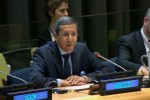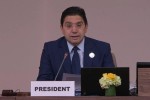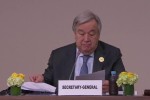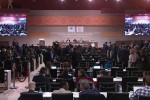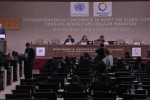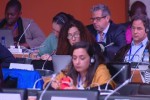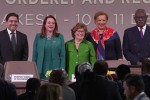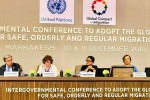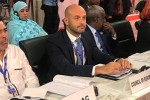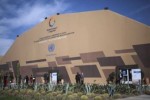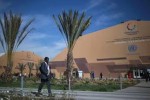ARCHIVE ACTIVITY
|
10 December 2018
Iniziative (EN) -
Federazione Anna Lindh Italia - Onlus (EN)
 The Fondazione Mediterraneo with its headquarters in Marrakech participated in the UN Migration Conference as an international observer.
The Fondazione Mediterraneo with its headquarters in Marrakech participated in the UN Migration Conference as an international observer.
The appointment was less than 30 countries (and among these Italy). The result was therefore satisfactory.
There are 164 Governments in the world that, on Monday, December 10, in Marrakech, approved the Global Compact for Immigration, the document promoted by the United Nations which provides for the sharing of some general guidelines on migration policies.
A "pact" to share principles, therefore not binding.
On Sunday evening, in front of an audience packed with journalists, the UN special representative for migration, Louise Arbor, immediately underlined it: this agreement is not binding and is aimed at greater cooperation between States on migration. But on one point the former high Canadian magistrate has been firm. "It is not a negotiating or consultative conference. Tomorrow (Monday 10 December), what was decided last July was signed. It is a reaffirmation of commitments taken earlier ».
A great applause goes to the host country, Morocco, which has made every effort to ensure that the framework of the Conference is up to the task. To welcome thousands of delegates is a large space where rows of palms and cactuses lead to modern sheds similar to large tents.
In the background the snow-covered chain of the Atlas.
But the absence of Italy, the only country that faces the Mediterranean not to be here, has not gone unnoticed.
The Global compact for a secure, orderly and regular migration (or simply Global Compact for immigration) is a document promoted by the UN that provides for the sharing of some general guidelines on migration policies. The goal is to give a coordinated and global response to the phenomenon.
This document, also insisting here in Marrakech the UN representatives, is based on the recognition of the need for a "cooperative approach to optimize the overall benefits of migration, addressing risks and challenges for individuals and communities in the countries of origin, transit and destination ".
The pact aims to achieve 23 immigration goals.
A sort of all-round multilateral approach in which all the actors involved are involved. It starts from data collection as a basis for the policies to be implemented. But the weight is also given to the contrast of the negative and structural factors that prevent people from building and maintaining livelihoods in their countries of origin.
The pact also intends to reduce the risks and vulnerabilities individuals face in the various stages of migration (including the fight against trafficking in human beings).
The guidelines identified in the document are the centrality of people, international cooperation, but also respect for the sovereignty of each state and compliance with international standards.
Italy has participated in all stages of the negotiations over the last two years. But on 27 November the Italian interior minister Matteo Salvini declared that he was against the Global Compact, because it would put "the so-called economic migrants and political refugees" on the same level, while other members of the League supported the minister's positions stating that document implies a risk of "uncontrolled immigration. Impossible for states to limit migratory flows".
This is why the president of the council Giuseppe Conte has sent back to parliament the examination of the plan arguing that Rome could accept the agreement at a later time, after the examination of the classroom: Italy therefore did not attend the summit in Marrakech and for now it will not be part of the Global Compact on Immigration.
- PROGRAM
- PRACTICAL GUIDE
- FINAL DOCUMENT
- GENERAL DEBATE
- INTERVENTION SG ANTONIO GUTERRES
- BREEFING
- CONFERENCE CLOSING
- VIDEO 1 - 2 - 3
- THE PRESS 1 - 2 - 3 - 4
- MARRAKECH HEADQUARTERS OF THE FONDAZIONE MEDITERRANEO
- MEDNEWS



